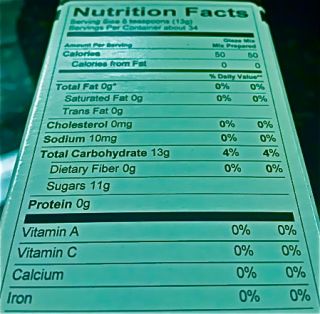
Diet
Is Your Diet SAD?
Likely, you are not getting the nutrition you think you are.
Posted September 29, 2015

So, is anyone getting the nutrients they really need? Sadly, the answer is a clear ‘no.’ Most of us consume the Standard American Diet, which you can shorten by just calling it ‘SAD.’
Aptly named, this diet fails to provide the high quality nutrients (such as folic acid, B vitamins) necessary for metabolic processes, antioxidant protection (such as vitamin E and C) needed to protect cells, or the necessary protein and amino acids (like tryptophan) needed to make mood neurotransmitters.
Features of the SAD diet include low vegetable intake, eating grains stripped of valuable nutrition, and consuming foods laden with pesticides that often come in containers that leach plastic chemicals into the food.
Highly processed foods found in our everyday world have many missing nutrients, and cannot deliver the same healthful messages to your body as whole, unrefined foods. Pesticides and plastics found in our food increase the likelihood of diabetes (1), cardiovascular disease(2) , and inflammation (3). Missing nutrients, plastic exposures and pesticides will all raise the likelihood of any disease to which a person may be predisposed.
"But I eat healthy – so I should be OK, right?"
For those of us eating relatively healthy, with plenty of produce and whole foods, we are unfortunately still not getting what is needed. It has been established that industrial agriculture of both crops and livestock, depletes soil of necessary nutrients. Fertilizing soil with highly soluble commercial sources of nutrients also has an effect on the balance of other nutrients availability. For example, heavy fertilization with ammonium-N can reduce potassium availability while fertilizers using extra magnesium can reduce calcium availability to the plant (4). Furthermore, it has been shown that pesticides decrease plant production of phytochemicals that are designed to protect the plant from environmental assault. These missing phytochemical compounds are needed for our health.
Comprehensive studies sponsored by the US government including the National Health and Nutrition Examination Surveys (HANES I and II), Ten State Nutrition Survey, and USDA nationwide food consumption studies, among others have revealed that marginal nutrient deficiencies exist in a substantial portion of the US population (approximately 50%) and that for some selected nutrients in certain age groups (such as vitamin B12 and vitamin D in the senior population), more than 80% of the group consumes less than the RDA(5).
An even more recent study by the American Dietetic association, including over 70 dietary analyses of twenty different diets from a cross section of people (from athletes to sedentary people) has shown that all diets reviewed astonishingly fell short of the recommended 100% RDA micronutrient levels from food alone. Of note, it was shown that the more active the person, the greater the tendency towards deficiency (6).
7 Steps to Avoid the SAD Diet
Here are a few steps to assure you are getting the right nutrition:
1 – Eat a cup of green vegetables everyday. A good assortment of green veggies have practically every vitamin your body needs – mix ‘em up and try new ones (like okra or dandelion) you haven’t tried before.
2 – Eat some berries and a fruit everyday. Fruits have high levels of natural anti-oxidants – even better than supplemental vitamins
3 – Add a healthy protein source to every meal: beans, quinoa, nut butters, grass fed beef, fish, natural poultry are all good sources
4 – Relax! Stress will shut down production of enzymes, which can stop you from absorbing your nutrients. Taking deep breaths before eating will help. Also, regular meditation and exercise will also help control stress hormones
5 - Eat organic and minimize plastics: The less pesticides the plant is exposed to, the more natural phytonutrients it has to make to protect itself – this means more nutrition for your body when you eat the organic food. Try to avoid food that comes in plastics and use glass containers like Pyrex to store your food.
6 – Step it up if you are athletic: if you exercise a lot, make sure you are doing the above everyday to make up for what you are burning.
7 – Consider supplements too: using a multiple vitamin, fish oil and probiotic. While supplements by themselves will not create proper nutritional balance, in reasonable doses, these will help assure you are getting all the vitamins you need, even if your food is missing some here and there. Also, a protein shake can help athletes who need a little extra. While you need to check quality of supplements, there are many good quality supplements out there to choose from. I use the supplements found on www.3UNeed.com
Peter Bongiorno, ND, LAc. is President of the New York Association of Naturopathic Physicians. In 2015, he authored the practitioner-guide Holistic Therapies for Anxiety and Depression (WW Norton). His upcoming book for the public, Put Anxiety Behind You: The Complete Drug-Free Program is available for preorder on Amazon. Visit drpeterbongiorno.com, InnerSourceHealth.com and join him on twitter @drbongiorno for updates on naturopathic mental health.
References:
1 - Lang IA, et al. Association of urinary bisphenol a concentration with medical disorders and laboratory abnormalities in adults. JAMA 2008; DOI:10.1001/jama.300.11.1303.
2 - Melzer D, Rice NE, Lewis C, Henley WE, Galloway TS. Association of urinary bisphenol a concentration with heart disease: evidence from NHANES 2003/06. PLoS One. 2010 Jan 13;5(1):e8673.
3 - Astiz M, de Alaniz MJ, Marra CA. The oxidative damage and inflammation caused by pesticides are reverted by lipoic acid in rat brain. Neurochem Int. 2012 Dec;61(7):1231-41.
4 - Karr M. Mineral and Nutrient Depletion in U.S. Farms and Range Soils. Youngevity Canada. http://www.canadianlongevity.net/misc/mineral_depletion.php accessed on December 2, 2012.
5 - National Research Council: Diet and Health. Implications for Reducing Chronic Disease Risk. National Academy Press,Washington, D.C., 1989
6 - Misner B. Food Alone May Not Provide Sufficient Micronutrients for Preventing Deficiency J Int Soc Sports Nutr. 2006; 3(1): 51–55.



